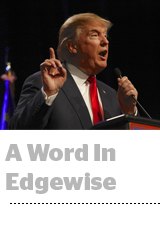 When Reuters reported last month that the Koch brothers’ organization, Freedom Partners, would sit out the remainder of the primary, the reason given was a worry that “spending millions of dollars attacking Trump would be money wasted, since they had not yet seen any attack on Trump stick.”
When Reuters reported last month that the Koch brothers’ organization, Freedom Partners, would sit out the remainder of the primary, the reason given was a worry that “spending millions of dollars attacking Trump would be money wasted, since they had not yet seen any attack on Trump stick.”
Political insiders now expect a change in that attitude as cracks materialize in Trump’s wall of support.
For instance, Ted Cruz’s recent wins in Utah and Wisconsin “set off a bit of a flurry in anti-Trump spending” after a period of quiet from Republican super PACs, said Jordan Lieberman, president of the voter targeting platform CampaignGrid.
The new round of fundraising and spending comes on the back of two complimentary trends: playbooks emerging for effective ways to counter Trump and a hardscrabble fight for delegates.
Liz Mair, a Republican media operative, runs targeted paid and earned campaigns meant to undercut Trump where he’s vulnerable to losing delegates. In Virginia, she ran campaigns in a Trump-favored district, and though he ended up winning, she helped Marco Rubio secure only one fewer delegate than Trump.
“It’s all about the delegate count,” said Mair, noting how in 2008 Hillary Clinton’s campaign focused on winning states and Barack Obama’s campaign focused on delegates.
Shift In The Wind
It may be too early to predict an avalanche of paid media from Republican groups and the Cruz camp, but any uplift in ad outlays will be welcome news to publishers, tech firms and political consultants who had braced for a major windfall this election season – and found themselves largely disappointed.
The uncertainty in the race put many of the biggest conservative spenders “in a holding pattern,” said Jaime Bowers, digital advertising director at the Republican ad agency National Media.
“The primary dollars have been disappointing from the digital side at least,” she said.
“In 2012, you had the Romney super PAC and other entities spending heavily across everything: search, social and display,” said Ryan Coyne, CFO of the conservative news company Independent Journal Review. “We’d love to be seeing tens of millions of dollars going to digital every month, but that’s just not the race we’re in.”
It isn’t that super PACs never stepped into the race. They spent $200 million combined in support of Jeb Bush and Rubio. But by the time Bush suspended his campaign in February, his primary super PAC, Right to Rise, had spent $25,000 on ads attacking Trump out of a total $85 million media budget.
Though the fight for delegates and jurisdictions provides a reason to raise funds and buy media, the ad buys are often so targeted that the overall investment can remain pretty small.
Lieberman has a client running anti-Trump ads, but ads are only running in districts where Trump’s edge is vulnerable. Additional targeting then narrows the pool further, to just 1 to 3% of likely voters in that district. Political groups love the voter precision, and are willing to pay higher CPMs for their audiences, but with so few people in a segment there often just aren’t many ads to buy.
Mair said she’s looking at a different model of targeting and media than in the past. For example, she’s eschewed traditional favorites like local news and cable TV in favor of reality TV shows aimed at men.
“That’s the analysis on where to find voters who are inclined toward Trump,” she said.
GOP Handicap
This is the point in the race when general election audience models would be getting put in place, which makes the uncertainty on the Republican side a meaningful disadvantage.
“Depending on the nominee, you’re looking at different activation audiences on either side,” said Peter Pasi, a GOP media consultant and VP at Collective, adding that those audiences will be particularly difficult to reach because they’re nontraditional voter sets.
Unfortunately, these audience models have to be built ahead of time – and at some cost, when you consider the polling, analytics and consulting hours that go into them.
“The challenge for Republicans is there’s a very good chance this goes to the convention, so creating the Trump model now is risky in terms of investment,” said Lieberman. “[Cruz] attracts the traditional Republican base but not swing voters. But Trump fans are more of a libertarian-authoritarian model.”
The Trump campaign is rippling throughout the Republican ticket as well.
“There’s more than one election happening in November,” sad Pasi. “Thirty-four senators are up, all 435 House members, attorneys general and all the down-ballot races.”
Said Lieberman, “I talked to four or five congressional candidates in the past day and a half asking me, ‘How do we handle Trump voters?’
“Having a model for that is really important if he is the nominee, but these candidates are terrified.”












